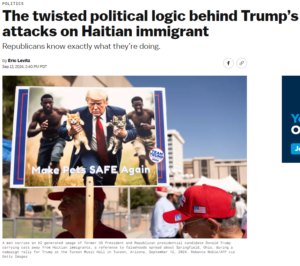Stochastic terrorism refers to when influential people, like politicians or public figures, spread dangerous rhetoric that encourages random acts of violence or hatred, even if they don’t directly tell anyone to commit those acts. By sharing hateful ideas or false stories, they create an atmosphere where some people may be provoked into violence on their own.
Blood libel is a historical term used to describe a false and malicious claim that a group, often a minority, commits horrific acts, usually for ritualistic purposes. It originated with the false accusation that Jewish people killed Christian children for religious purposes, but now it can refer to any fabricated claim meant to demonize a particular group.
An example combining both of these concepts occurred when President Trump, during a debate, falsely claimed that Haitian migrants were eating dogs and cats. Even though he was corrected on air, the damage had already been done. His surrogates, including his VP nominee J.D. Vance, repeated the lie afterward. This type of false narrative stirs up fear and hatred, and while neither Trump nor Vance directly encouraged violence, their rhetoric could lead to violent acts against Haitian migrants. This kind of messaging fits both the idea of stochastic terrorism and a modern-day blood libel, as it falsely portrays a group in a way that encourages fear, hatred, and possible harm.
This incident has produced a number of memes and parodies. There is concern by those within Calign Up Justice that a lot of the humor fails to acknowledge the threatening racism and destabilizing elements at play in it.
Explainer Video
@claudiaalicklove Stochastic Terrorism is an important term to learn about. This educational video defines the term and allows you to reflect on contemporary impacts of this practice. #greenscreen
♬ Documentary Music – Dian Fadli
Related Content

